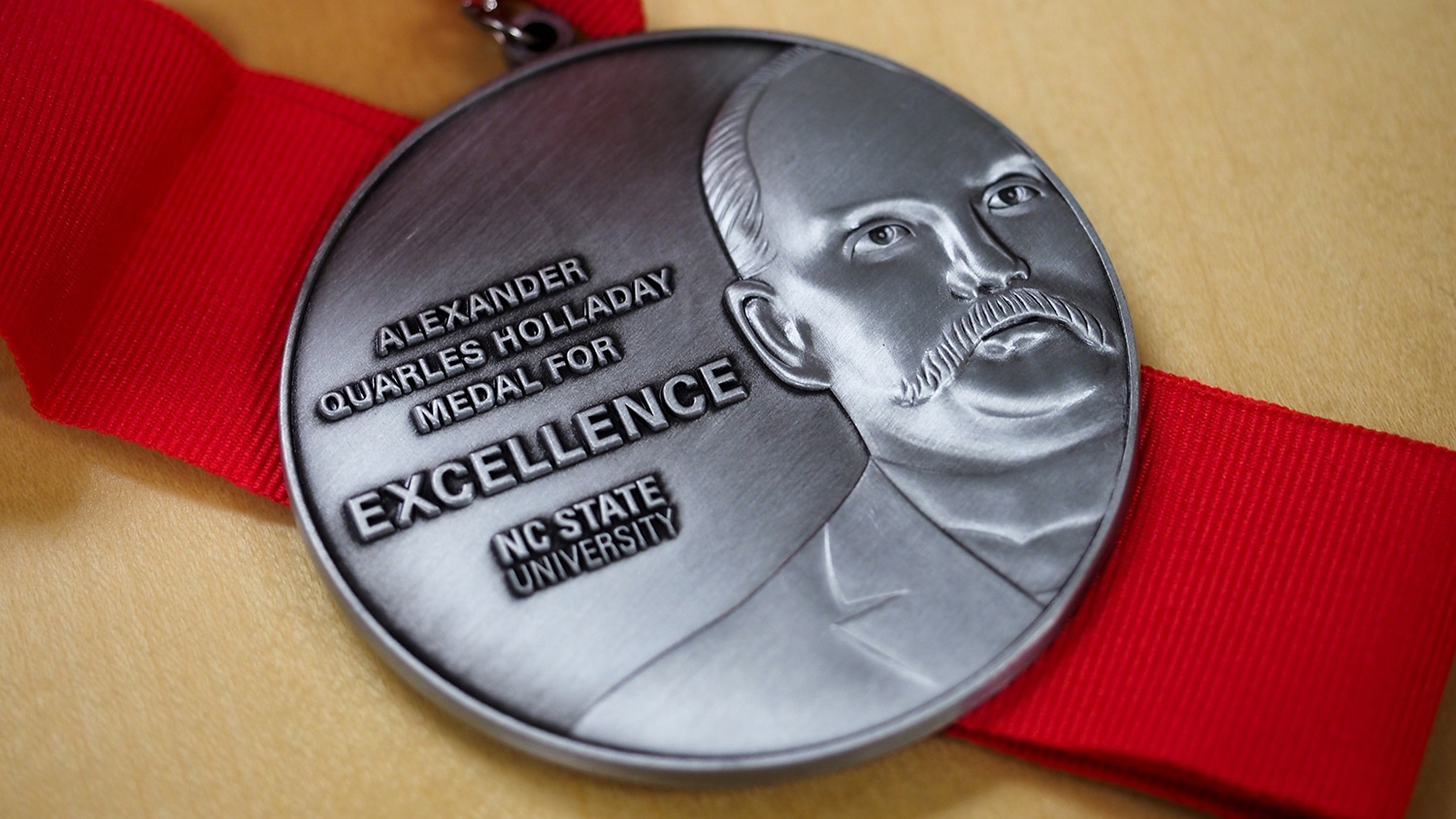Partnership with local school district, industry to bring STEM experiences and opportunities to rural students


Dr. Tameshia Ballard Baldwin wants to provide rural students in Edgecombe County Public Schools (ECPS) with the same access to high-quality STEM educational opportunities as their peers throughout North Carolina. A new four-year, $1.4 million National Science Foundation grant will allow Baldwin, in partnership with ECPS and local industry, to develop an innovative community-based engineering model to support science, technology, engineering and mathematics (STEM) knowledge, identity and career awareness of rural, economically disadvantaged students.
Baldwin, who serves a dual role in the Colleges of Engineering and Education as an assistant professor and director of engineering education, is the principal investigator (PI) on the project titled “Developing STEM Identity in Rural Audiences through Community-Based Engineering Design.” Dr. LaTricia Townsend, director of federal program monitoring and support at the North Carolina Department of Instruction and former director of evaluation programs for the Friday Institute for Education Innovation, is co-PI on the project. Braska Williams, director of the North Carolina Mathematics and Science Education Network Pre-College Program (MSEN) at the Friday Institute for Educational Innovation, and Angelitha Daniel, director of the Minority Engineering Programs at NC State, serve as senior personnel.
The goals of this project are to increase the self-efficacy of ECPS students at Phillips Middle School and West Edgecombe Middle School as well as enhance their ability to complete STEM tasks, increase their interest in STEM and STEM careers, and build their STEM identities.
The U.S is currently facing a shortage of qualified STEM workers, with many statewide and national efforts in place to recruit and retain more students in STEM fields. However, Baldwin said rural students are often left behind because they lack equitable access to high-quality STEM education opportunities.
“That was the main reason why we decided to pursue this project, because rural areas face unique challenges, such as not having adequate professional development opportunities for their teachers, so they can’t get the STEM training that they need to be able to then deliver that instruction to the classroom. They also face challenges with proximity to resources. Because of this, we’ve decided we should try to do something about this [issue],” Baldwin said.
ECPS currently has STEM initiatives in place in their elementary and high schools. The district has developed a science, technology, engineering, arts and mathematics (STEAM) strategic plan for their district that includes having two STEM labs in elementary schools, hosting a STEM design challenge, providing mentorship opportunities and participating in a FIRST Robotics competition. However, they are still in the process of working to develop STEM programming for their five middle schools to bridge that gap between elementary and high school.
“We’re trying to start this thing with middle school to get these kids prepared so that when they get to high school, they know what they’re working towards,” said Matthew Mayo, director of technology and media for ECPS who oversees digital teaching and learning for the district. “We had already started the conversation around STEM and were really trying to make things vertically aligned as far as how STEM would be in the elementary, middle and high schools.”
The project team will work with local industry in Edgecombe County to develop engineering design experiences closely tied to local advanced manufacturing technologies and practices. They will then develop a three-part engineering design elective course, incorporate STEM professionals and undergraduate engineering students from the NC State Minority Engineering Programs to serve as mentors, and provide in-depth STEM experiences outside the classroom, including participation in the MSEN Saturday Academy and summer camp. The Engineering Place, the College of Engineering’s K-20 educational outreach program, is also involved in the grant. Susan D’Amico, coordinator of The Engineering Place, will be providing training for the undergraduate students in the MEP to give them the tools needed to be effective mentors and to support the middle school teachers.
Williams says the key piece of this project is the mentors.
“Everything we’ve done, we’ve always had minority engineering students come as mentors. That’s been very important. We’ve found they had a huge impact,” Williams said. “They’ll be there to offer their expertise, and they’ll probably have to help the students in a different way than what the teacher can, but also they’re serving as role models. We want students to see students that look like themselves who are already engineering students so they can say, ‘Well if this person did it, then I can do it.’”
The project team hopes that these efforts will not only increase interest in pursuing STEM careers but also highlight potential careers tied to local industry in an effort to bring students back to the area after learning these technical skills. According to Baldwin, rural areas suffer from “rural brain drain” where the smartest and brightest students go to college and never come back. Her team hopes to show students the opportunities for advanced manufacturing jobs that exist in the area, including world-renowned companies such as Sara Lee, Cummins and Honeywell.
“Students aren’t aware of the opportunities available for them within the community,” Baldwin said. “Why not build the talent in the community such that they can continue to have their facilities there because they have the workforce that they need to sustain the business?”
ECPS realizes that this is an issue and has partnered with the Strategic Twin-Counties Education Partnership (STEP) in Nash and Edgecombe counties to develop strong relationships with local community colleges and 19 industry partners who are committed to building and strengthening the workforce within their communities.
This grant opportunity with NC State came along at the perfect time as these partnerships were forming, says Mayo.
“It was the perfect storm because we had just started the partnership with the businesses and looking at this grant together, it just fit,” Mayo said. “It was a natural fit. It wasn’t like we were doing one more thing. It was actually taking what we were doing and making it stronger.”
Baldwin and her team listened to the district’s needs and worked together to meet them.
She believes that this partnership was important to provide the most impactful way to get students into STEM.
“What the research shows so far is that in order to get more rural students interested in STEM, it’s going to require partnerships between these rural school districts, institutions of higher education, local community, all working together,” Baldwin said.
Over the next four years, 320 students will participate in this free program and will take the three-year engineering design elective course beginning in 6th grade. During the course, students will participate in technology rich, hands-on STEM experiences including building advanced manufacturing systems using robotics, computers and microcontrollers.
Project staff member and Friday Institute Research Associate Callie Edwards, Ph.D., will focus on the impact of the program on students’ and teachers’ STEM content knowledge and awareness of STEM career pathways. Through site visits, surveys, assessments, interviews and more, Edwards will collect and analyze all qualitative and quantitative data from the project in an effort to better understand and promote practices that increase student interest and capacities to pursue STEM careers.
Both Edwards and Baldwin are first generation college students who understand what these students are going through and have a personal interest in their success.
“Coming from a fairly rural area myself, I understand the challenges that I faced trying to navigate this whole STEM area,” Baldwin said. “I sort of feel a personal obligation to give back in that sense because I was fortunate enough to be able to navigate those waters. I know how important it is to provide that exposure. Students in those areas, they simply don’t know what’s possible because they haven’t seen it. These are the types of things or opportunities that are available to you if you just put in the work, the effort and acquire the skills you need through education to be able to make a better quality of life for yourself and your family.”
ECPS also understands this, and Mayo sees this grant contributing to their larger equity vision in which their schools are “a place where opportunities are no longer predicted by their social, cultural or economic factors.”
“To me, that’s almost the heartbeat of what this grant is about and that’s the doors it’s going to open up for all of our kids,” Mayo said.
- Categories:


